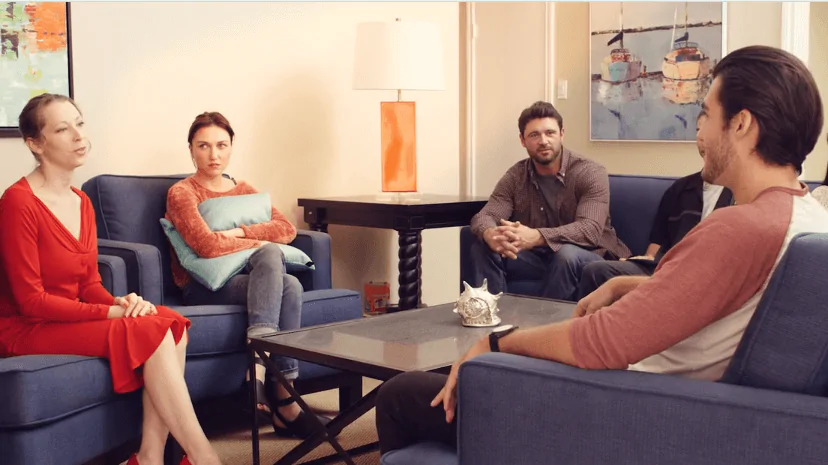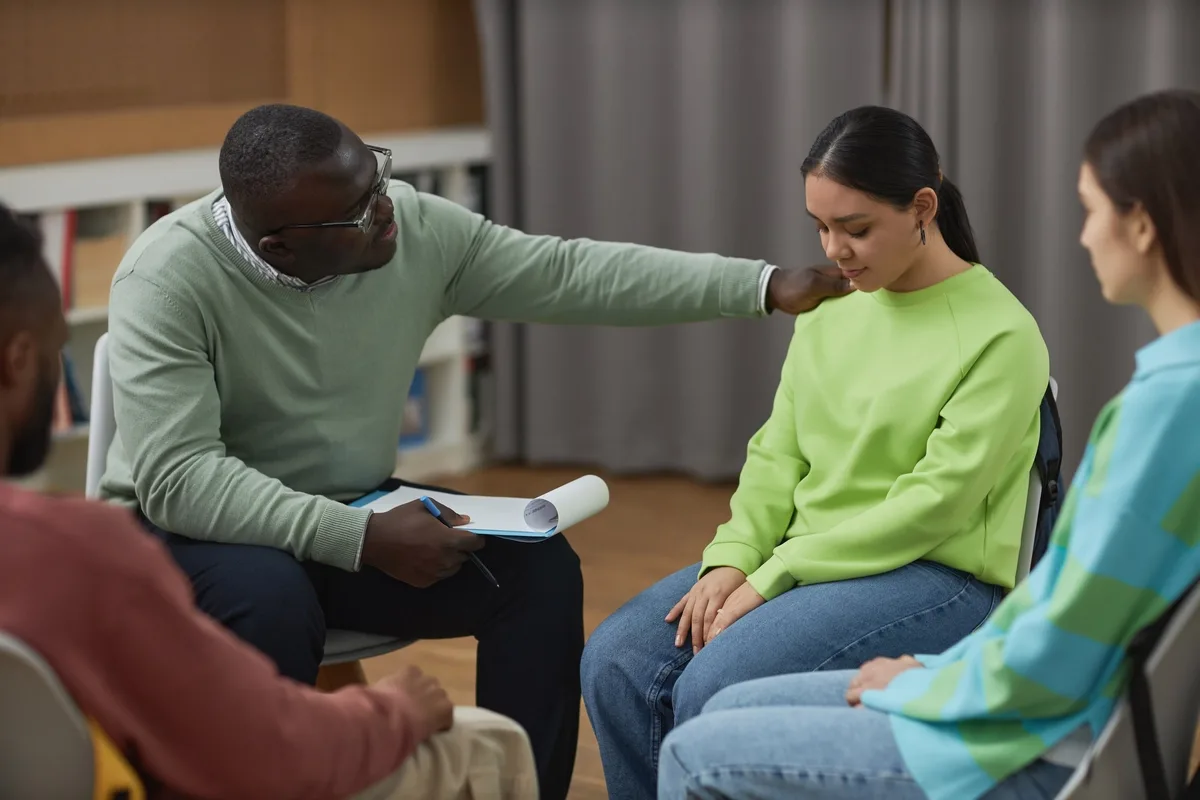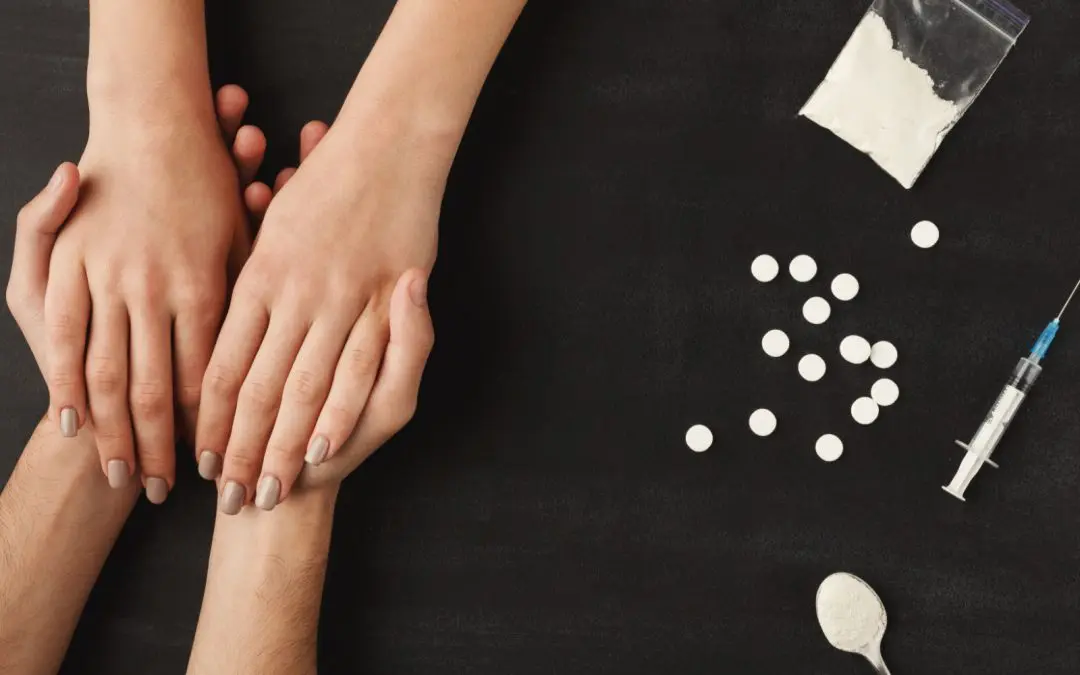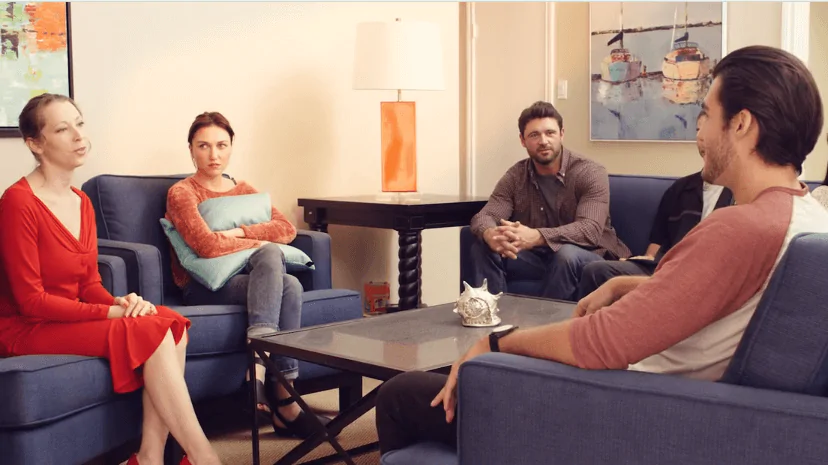24/7 Helpline:
(866) 899-111424/7 Helpline:
(866) 899-1114
Other Insurance Options

Excellus

Optima

Providence

CareFirst

WellPoint

Oxford

ComPsych

UnitedHealth Group

Regence

Ambetter

Group Health Incorporated

Medical Mutual of Ohio

BHS | Behavioral Health Systems

AllWell

Covered California

Optum

Health Net

Sliding scale payment assistance

Humana

Health Partners



AMITA Health Alexian Brothers Behavioral Health Hospital Hoffman Estates
AMITA Health Alexian Brothers Behavioral Health Hospital in Hoffman Estates, IL provides comprehensi...

Pilsen Wellness Center – Cermak Road
Pilsen Wellness Center, located in Chicago, Illinois, is an outpatient mental and behavioral health ...

Arlington Center for Recovery
Arlington Center for Recovery is a private rehab located in Arlington Heights, IL. Arlington Center ...

Youth Outreach Services – Austin Office
Youth Outreach Services promotes the strengths and abilities of youth and families by providing comm...

Youth Outreach Services – Leyden – Proviso Office
Youth Outreach Services promotes the strengths and abilities of youth and families by providing comm...

Compass Health Center
Compass Health Center- Chicago offers outpatient addiction treatment services to adolescents and adu...

Metropolitan Family Services
Metropolitan Family Services is a private rehab located in Chicago, Illinois. Metropolitan Family Se...

Jimare Wellness Counseling Center
Jimare Wellness Counseling Center is a counseling clinic hab located in Cicero, IL. Jimare Wellness ...

Trilogy Behavioral Healthcare
Trilogy Behavioral Healthcare is a comprehensive mental health care and addiction recovery program f...

Associates in Professional Counseling
Associates in Professional Counseling is an outpatient rehab located in Palos Heights, IL. Associate...

Loretto Hospital Behavioral Health
Loretto Hospital Behavioral Health is a private rehab located in Chicago, Illinois. Loretto Hospital...

Treatment Centers of Illinois
Treatment Centers of Illinois is an outpatient rehab located in Palatine, IL. Treatment Centers of I...

Association House
Association House is a private rehab located in Chicago, Illinois. Association House specializes in ...

Habilitative Systems
Habilitative Systems (HSI) is a nationally-recognized human services agency that uses a continuum of...

Thresholds – Rowan Trees
Thresholds – Rowan Trees is a non-profit rehab located in Chicago, Illinois. Thresholds – Rowan Tree...

Positive Sobriety Institute
The Positive Sobriety Institute is a drug rehab center that specializes in helping professionals ove...

Hazelden Betty Ford Foundation
Hazelden Betty Ford Foundation, located in Chicago, Illinois, is a drug and alcohol rehab for adoles...

DUI Counseling Center at Cumberland Business
DUI Counseling Center at Cumberland Business is a private rehab located in Harwood Heights, Illinois...

Heartland Health Outreach
Heartland Health Outreach is a private rehab located in Chicago, Illinois. Heartland Health Outreach...

Living Trees Center
Living Trees Center is a private rehab located in Chicago, Illinois. Living Trees Center specializes...

Drexel Counseling Services
Drexel Counseling Services is a private rehab located in Chicago, Illinois. Drexel Counseling Servic...

Above and Beyond Family Recovery Center
Above and Beyond Family Recovery Center is a licensed Level I and Level II outpatient addiction trea...

Healthcare Alternative Systems – North Humboldt
Healthcare Alternative Systems - North Humboldt is a residential facility that offers treatment for ...

Rosecrance Lakeview
Rosecrance Lakeview is a dual-diagnosis addiction rehab center in Chicago, IL for individuals and fa...

Palos Community Hospital – Behavioral Health
Palos Community Hospital - Behavioral Health offers the full spectrum of behavioral health services ...

Guildhaus Halfway House
Guildhaus Halfway House is a private rehab located in Blue Island, Illinois. Guildhaus Halfway House...

HRDI – Medication Assisted Treatment
HRDI – Medication Assisted Treatment is a private rehab located in Chicago, Illinois. HRDI – Medicat...

Lutheran Social Services of Illinois
Lutheran Social Services of Illinois is a private rehab located in Arlington Heights, Illinois. Luth...

Victory Vision Counseling
Victory Vision Counseling is a private rehab located in Mount Prospect, IL. Victory Vision Counselin...

Pilsen Wellness Center – Little Village
Pilsen Wellness Center – Little Village is a private rehab located in Chicago, Illinois. Pilsen Well...

Latino Treatment Center
Latino Treatment Center is a substance abuse treatment rehab in Chicago, IL that provides bilingual ...

Treatment Centers of Illinois
Treatment Centers of Illinois is an outpatient rehab located in Schaumburg, IL. Treatment Centers of...

DUI Metropolitan Services – Archer Avenue
DUI Metropolitan Services – Archer Avenue is a private rehab located in Chicago, Illinois. DUI Metro...

Community Counseling Center – C4 Clark
Community Counseling Center – C4 Clark is a private rehab located in Chicago, Illinois. Community Co...

AMITA Health Community Mental Health Center Chicago
Presence Saints Mary and Elizabeth Medical Center - Nazareth Family Center provides treatment for ad...

Le Penseur Youth & Family Services
Le Penseur Youth & Family Services is a counseling clinic located in Chicago, IL. LePenseur Family S...

Access Behavioral Services
Access Behavioral Services is dedicated to provide outpatient services for individuals struggling wi...

Pillars – Fillmore Center
Pillars–Fillmore Center is an outpatient mental and behavioral health care facility in Berwyn, Illin...

Counseling Center of Illinois
Counseling Center of Illinois - South Roberts Road of Illinois provides individual counseling for a ...

Indiana Avenue DUI Service
Indiana Avenue DUI Service is a private rehab located in Chicago, Illinois. Indiana Avenue DUI Servi...
Beacon Therapeutic – Longwood Campus
Beacon Therapeutic – Longwood Campus is a private rehab located in Chicago, Illinois. Beacon Therape...

Center for Addictive Problems
Center for Addictive Problems is a private rehab located in Chicago, Illinois. Center for Addictive ...

Counseling Center of Illinois
Counseling Center of Illinois - South Wilke Road provides individual counseling for a variety of iss...

NuWay Community Services
NuWay Community Services is a private rehab located in Chicago, Illinois. NuWay Community Services s...

MacNeal Hospital Psychiatry and Behavioral Health
MacNeal Hospital Psychiatry and Behavioral Health, located in Berwyn, Illinois, treats mental health...

Pilsen Wellness Center – Brighton Park
Pilsen Wellness Center–Brighton Park, located in Chicago, Illinois, is an outpatient drug and alcoho...

Katherine Boone Robinson Foundation
Katherine Boone Robinson Foundation is a private rehab located in Chicago, Illinois. Katherine Boone...

Rosecrance Northbrook Office
Rosecrance - Northbrook Office is a private not-for-profit organization offering behavioral health s...

Chicago Treatment and Counseling Center – South Ashland Avenue
Chicago Treatment and Counseling Center – South Ashland Avenue is a private rehab located in Chicago...

Healthcare Alternative Systems – West Armitage
Healthcare Alternative Systems - West Armitage is an outpatient facility that offers treatment for i...

Professional Counseling Services
Professional Counseling Services is a private rehab located in Chicago, Illinois. Professional Couns...

Counseling First
Counseling First is a private rehab located in Chicago, Illinois. Counseling First specializes in th...

La Familia Counseling
La Familia Counseling is a private rehab located in Hanover Park, Illinois. La Familia Counseling sp...

DUI Counseling Center
DUI Counseling Center provides outpatient alcohol and drug treatment classes and counseling for adul...

Emages
Emages is a private rehab located in Chicago, Illinois. Emages specializes in the treatment of alcoh...

American Indian Health Service
American Indian Health Service is a private rehab located in Chicago, Illinois. American Indian Heal...

Fola Community Action Services
Fola Community Action Services is a non-profit rehab located in Chicago, Illinois. Fola Community Ac...

AMITA Health Center for Mental Health
Alexian Brothers Center for Mental Health is located in Arlington Heights, Illinois. Alexian Brother...

Families and Adolescents in Recovery – FAIR Counseling
Families and Adolescents in Recovery – FAIR Counseling is a private rehab located in Schaumburg, Ill...

Pilsen Wellness Center
Pilsen Wellness Center is a private rehab located in Melrose Park, Illinois. Pilsen Wellness Center ...

Center for Behavioral Health
Center for Behavioral Health is a private rehab located in Schaumburg, Illinois. Center for Behavior...

Rincon Family Services – Rafael Paloma Rios Center
Rincon Family Services – Rafael Paloma Rios Center is a private rehab located in Chicago, Illinois. ...

Streamwood Behavioral Health Center
Streamwood Behavioral Health Center is a comprehensive mental health and dual diagnosis care facilit...

Alternatives
Alternatives is a private rehab located in Chicago, Illinois. Alternatives specializes in the treatm...

A Safe Haven
A Safe Haven is a non-profit rehab located in Chicago, Illinois. A Safe Haven specializes in the tre...

South East Alcohol and Drug Abuse Center (SEADAC)
South East Alcohol and Drug Abuse Center is one of the largest outpatient clinic provider around the...

Greater Lawn Mental Health Center
Greater Lawn Mental Health Center is a private rehab located in Chicago, Illinois. Greater Lawn Ment...

State of Mind Mental Health and Consultation Services
State of Mind Mental Health and Consultation Services is a counseling clinic located in Hazel Crest,...

Chicago Read Mental Health Center
Chicago Read Mental Health Center, in Chicago, Illinois, provides psychiatric care and addiction rec...

McDermott Center – Men’s Detox
McDermott Center – Men’s Detox is a non-profit rehab located in Chicago, Illinois. McDermott Center ...

Concerned Citizens – Mothers House
Concerned Citizens – Mothers House is a private rehab located in Chicago, Illinois. Concerned Citize...

A Safe Haven – South Kingston Street
A Safe Haven – South Kingston Street is a private rehab located in Chicago, Illinois. A Safe Haven –...

Gateway Foundation Chicago Independence
Located only four miles from downtown, Gateway Foundation Chicago Independence provides affordable a...

One Direction Forward
One Direction Forward is a non-profit rehab located in Matteson, Illinois. One Direction Forward spe...

Gateway Foundation
Gateway Foundation offers inpatient and outpatient treatment for individuals with substance addictio...

ICAN Community Services
ICAN Community Services is a private rehab located in South Holland, Illinois. ICAN Community Servic...

Pilsen Wellness Center – Gage Park
Pilsen Wellness Center offers mental health services programs for children, adolescents and adults d...

Sundance Methadone Treatment Center
Sundance Methadone Treatment Center is a private rehab located in Chicago, Illinois. Sundance Methad...

Gateway Foundation – Kedzie Recovery Home
Gateway Foundation–Kedzie Recovery Home, in Chicago, Illinois, offers transitional housing and outpa...

Turning Point Behavioral Health Center
Turning Point Behavioral Health Center is a private rehab located in Skokie, Illinois. Turning Point...

Pilsen Wellness Center
Pilsen Wellness Center is a private rehab located in Stone Park, Illinois. Pilsen Wellness Center sp...

Association for Multicultural – Behavioral Health
Association for Multicultural – Behavioral Health is a private rehab located in Chicago, Illinois. A...

Grace House
Grace House is a non-profit rehab located in Chicago, IL. Grace House offers substance abuse treatme...

Grand Prairie Services
Grand Prairie Services offers emergency behavioral healthcare to individuals at risk of harming them...

Recovery Concepts
Recovery Concepts is a private rehab located in Hazel Crest, IL. Recovery Concepts specializes in th...

Cornerstone Recovering Community – 139 West 112th Street
Cornerstone Recovering Community – 139 West 112th Street is a private rehab located in Chicago, Illi...

AMITA Health Addiction Services – Commonwealth Avenue
Presence Behavioral Health Addiction Services Professionals Program is located on the shores of Lake...

DePaul Family and Community Services
DePaul Family and Community Services is a private rehab located in Chicago, Illinois. DePaul Family ...

Elite House of Sober Living
Elite House of Sober Living is a structured recovery residence for adults, located in Chicago Height...

South Central Community Services
South Central Community Services is a private rehab located in Chicago, Illinois. South Central Comm...

Pilsen Wellness Center
Pilsen Wellness Center is a private rehab located in Cicero, Illinois. Pilsen Wellness Center specia...

Healthcare Alternative Systems – North Ashland
Healthcare Alternative Systems - North Ashland is an outpatient facility that offers treatment for i...

New Hope Community Service Center
New Hope Community Service Center is a private rehab located in Chicago, Illinois. New Hope Communit...

Renewed Hope Community Services
Renewed Hope Community Services is a private rehab located in Chicago, Illinois. Renewed Hope Commun...

Jewish Family Services – Counseling Center – Northbrook
Jewish Family Services – Counseling Center – Northbrook is a private rehab located in Northbrook, Il...

Pillars
Pillars offers comprehensive mental health, substance abuse and social services to men, women, child...

Prevention Classes
Prevention Classes specialized services include DUI Risk Education Classes, Alcohol and Drug Evaluat...

Affordable Recovery Housing
Affordable Recovery Housing offers safe housing for men with a desire to remain abstinent from chemi...

Advocate Lutheran General Hospital – Behavioral Health Services
Advocate Lutheran General Hospital offers a full range of behavioral disorder treatments through its...

Henry’s Sober Living House – Ingleside
Henry's Sober Living House - Ingleside provides assistance for those who have successfully completed...

Thresholds – Ravenswood Avenue
Thresholds – Ravenswood Avenue is a non-profit rehab located in Chicago, Illinois. Thresholds – Rave...

Eva Mae Recovery Hope
Eva Mae Recovery Hope is a private rehab located in Chicago, Illinois. Eva Mae Recovery Hope special...

Haymarket Center
Haymarket Center provides substance use disorder treatment, behavioral health, and primary health ca...

Bayrach DUI Counseling Center
Bayrach DUI Counseling Center is a private rehab located in Chicago, Illinois. Bayrach DUI Counselin...

Saint Anthonys Hospital – Behavioral Health Services
Saint Anthonys Hospital – Behavioral Health Services is a private rehab located in Chicago, Illinois...

DUI Metropolitan Services
DUI Metropolitan Services is a private rehab located in Chicago, Illinois. DUI Metropolitan Services...

Schaumburg Interventions and Counseling Center – SICC
Schaumburg Interventions and Counseling Center – SICC is a private rehab located in Schaumburg, Illi...

Solley’s Place
Solley’s Place is a private rehab located in Oak Lawn, Illinois. Solley’s Place specializes in the t...

AMITA Health Addiction Services Palos Heights
Presence Health Addiction Services provides treatment for alcoholism or addiction. Presence Health A...

Hartgrove Behavioral Health Services
Located in Chicago, IL, Hartgrove Behavioral Health Services stands as a CARF-accredited addiction t...

LSSI Addiction Treatment Center – Kenmore
Kenmore Center for Addiction of LSSI is a rehab facility located in Chicago, IL. Kenmore Center for ...

Peer Services
PEER Services provides outpatient substance use treatment for alcohol and other drugs to teens (12+)...

Uptown DUI Services
Uptown DUI Services is a private rehab located in Chicago, Illinois. Uptown DUI Services specializes...

Chicago Treatment & Counseling Center (II)
Chicago Treatment & Counseling Center (II) is a private rehab located in Chicago, Illinois. Chicago ...

Valrie’s Evaluation Services
Valrie’s Evaluation Services is a private rehab located in Palos Heights, Illinois. Valrie’s Evaluat...

Childrens Home and Aid Society
Childrens Home and Aid Society is a private rehab located in Chicago, Illinois. Childrens Home and A...

Kenneth Young Center
Kenneth Young Center is a private rehab located in Hoffman Estates, Illinois. Kenneth Young Center s...

Family Guidance Centers
Family Guidance Centers is a private rehab located in Des Plaines, Illinois. Family Guidance Centers...

Habilitative Systems – Tabitha House
Habilitative Systems–Tabitha House, located in Chicago, Illinois, is an inpatient drug and alcohol r...

Professional Diagnostic Services
Professional Diagnostic Services is an outpatient rehab located in Chicago, IL. Professional Diagnos...

Chicago Treatment and Counseling Center – South Cicero Avenue
Chicago Treatment and Counseling Center is a private rehab located in Cicero, IL. Chicago Treatment ...

Rincon Family Services – Hilda Frontany Women’s Center
Rincon Family Services–Hilda Frontany Women’s Center, located in Chicago, Illinois, is an outpatient...

Alon Treatment Center
Alon Treatment Center offer substance abuse treatment in an outpatient setting. Alon Treatment Cente...

Prentice Place
Prentice Place, in Chicago, Illinois, is a halfway house for adult men in recovery who are exiting a...

NorthShore Medical Group
NorthShore Medical Group offers general psychiatric medication management and a variety of psychothe...

Thresholds – Mothers Program
Thresholds – Mothers Program is a private rehab located in Chicago, Illinois. Thresholds – Mothers P...

Alexian Brothers Behavioral Health Group Practice
Alexian Brothers Behavioral Health Group Practice - Parish Services is a rehab located in Schaumburg...

Sergeant Lara Center – Pilsen Wellness
Sergeant Lara Center – Pilsen Wellness is a private rehab located in Chicago, Illinois. Sergeant Lar...

NorthShore Deerfield Behavioral Health Center
NorthShore Deerfield Behavioral Health Center offers a wide variety of services focused on the uniqu...

Leyden Family Service – Aftercare Center
Leyden Family Service - Aftercare Center provides outpatient programs for adults, children, and adol...

Leyden Family Service and Mental Health Center
Leyden Family Service and Mental Health Center provides extensive mental health and psychotherapy se...

The South Suburban Council on Alcoholism and Substance Abuse
The South Suburban Council on Alcoholism and Substance Abuse provides affordable and effective chemi...

Leyden Family Service – SHARE
Leyden Family Services SHARE program is a drug and alcohol rehabilitation facility in Hoffman Estate...

Family Guidance Centers
Family Guidance Centers is a counseling clinic located in Chicago, IL. Family Guidance Centers speci...

Claudia’s Place
Claudia's Place is a safe haven home located in Hazel Crest, Illinois. Claudia's Place provides a so...

Polish American Association – Starting Point
Polish American Association - Starting Point is a private rehab located in Chicago, IL. Polish Ameri...

Lawrence Center – Outpatient
Lawrence Center – Outpatient is a private rehab located in Chicago, Illinois. Lawrence Center – Outp...

DUI Community Counseling
DUI Community Counseling is a private rehab located in Chicago, Illinois. DUI Community Counseling s...

AMITA Health Foglia Family Foundation Residential Treatment Center
Ascension Illinois - Foglia Residential Treatment treats alcohol and drug abuse and other mental dis...

AMITA Health Behavioral Medicine Group Practice Hoffman Estates
Alexian Brothers Behavioral Health Group Practice is located in Hoffman Estates, Illinois. Alexian B...

Counseling Center of Illinois – North Milwaukee Avenue
Counseling Center of Illinois - North Milwaukee Avenue provides individual counseling for a variety ...

Presence Behavioral Health
Presence Behavioral Health provides treatment for addiction and behavioral health. Presence Behavior...

Teen Challenge
Teen Challenge is a non-profit organization located in Chicago, IL. Teen Challenge specializes in th...

Safer Foundation
Safer Foundation provides outpatient mental and behavioral health care for justice-involved adults i...

Human Resources Development Institute – 114 Street
Human Resources Development Institute - 114 Street offers outpatient services to adolescents struggl...

Symetria Recovery – Palos Heights
Symetria Recovery–Palos Heights is an outpatient drug and alcohol rehab for adults in Palos Heights,...

Chicago Treatment and Counseling Centers
Chicago Treatment and Counseling Centers is a private rehab located in Chicago Ridge, Illinois. Chic...

SunCloud Health – Chicago Lincoln Park Treatment Center
SunCloud Health is a private outpatient center serving patients in Chicago, Illinois. SunCloud Healt...

WestCare – Community Involvement Center
WestCare - Community Involvement Center offers outpatient substance abuse treatment for men, women a...

SunCloud Health – Northbrook Treatment Center
SunCloud Health is a private integrative outpatient treatment center in Northbrook, Illinois, servin...

Yellowbrick
Yellowbrick specializes in the treatment of troubled emerging adults and their families. Yellowbrick...

Existential Counselor Society – Outpatient
Existential Counselor Society - Outpatient is located in Hazel Crest, Illinois. Existential Counselo...

St. Leonard’s Ministries – Michael Barlow Center
St. Leonard’s Ministries - Michael Barlow Center is a non-profit rehab located in Chicago, IL. St. L...

Youth Outreach Services – Pilsen Office
Youth Outreach Services - Pilsen Office is located in Chicago, IL. Youth Outreach Services - Pilsen ...

Abraxas Southwood Interventions
Abraxas Southwood Interventions, in Chicago, Illinois, is a comprehensive, 12 step focused drug and ...

Child Adolescent and Family Recovery Center
Child Adolescent and Family Recovery Center - West Higgins Road is located in Hoffman Estates, Illin...

Haymarket Center – Uptown
Haymarket Center - Uptown is located in Chicago, Illinois. Haymarket Center - Uptown helps individua...

AFG Guidance Center
AFG Guidance Center is a private rehab located in Kenilworth, Illinois. AFG Guidance Center speciali...

ModernMed Recovery – Park Ridge Clinic
ModernMed Recovery is the premier program in the Chicago area, providing medication-assisted treatme...

North Central New Life For Girls
North Central New Life For Girls is a recovery center located in Chicago, IL. North Central New Life...

Alexian Brothers Behavioral Health Group Practice
Located in Elk Grove Village, Indiana, Alexian Brothers Behavioral Health Group Practice offers alco...

WestCare – Crossroads Adult Transition Center
WestCare – Crossroads Adult Transition Center is a non-profit rehab located in Chicago, Illinois. We...

Timberline Knolls Residential Treatment Center
Timberline Knolls Residential Treatment Center is a mental health care and addiction recovery facili...

Rogerian Solutions
Rogerian Solutions provides affordable DUI Evaluations, Investigative Alcohol and Drug Evaluations, ...

Garfield Counseling Center
Garfield Counseling Center is a private rehab located in Chicago, Illinois. Garfield Counseling Cent...

Thresholds – West 47th Street
Threshold–West 47th St. is an outpatient mental and behavioral health care facility for adults in Ch...

Tapestry 360 Health – Devon
Tapestry 360 Health – Devon is a private rehab located in Chicago, Illinois. Tapestry 360 Health – D...

Christian Community Health Center
Christian Community Health Center is a non-profit rehab located in Chicago, IL. Christian Community ...

Project C.O.A.T.
Project C.O.A.T. is a public rehab located in Oak Lawn, Illinois. Project C.O.A.T. specializes in th...

AMITA Health Community Mental Health Center Westchester
Presence Behavioral Health - Center for Wellbeing provides treatment for addiction and behavioral he...

Anixter Center Addiction Recovery for the Deaf
Anixter Center Addiction Recovery for the Deaf is a private rehab located in Chicago, Illinois. Anix...

Habilitative Systems – Clara Hope House
Habilitative Systems - Clara Hope House provides residential housing in a community setting and an a...

A Fresh Start Sober Living Environments
A Fresh Start Sober Living Environments is a sober living facility located on the north side of Chic...

Gateway Alcohol and Drug Treatment Center – Chicago River North
Gateway Alcohol and Drug Treatment Center - Chicago River North offers outpatient treatment for indi...

Saint Bernard Hospital – Behavioral Health
Saint Bernard Hospital - Behavioral Health offers inpatient treatment for individuals needing behavi...

South Shore Hospital – Medical Detox
South Shore Hospital offers inpatient detoxification services for adults struggling with any substan...

Community Counseling Center – C4 North
Community Counseling Center – C4 North is a private rehab located in Chicago, Illinois. Community Co...

Symetria Recovery – Chicago
Symetria Recovery specializes in opioid addiction treatment in an outpatient setting, with a program...

Pilsen Wellness Center
Pilsen Wellness Center offers expert bilingual mental health treatment services for adults, children...

Timberline Knolls Residential Treatment Center
Timberline Knolls Residential Treatment Center substance abuse and behavioral health recovery progra...

Community Counseling Center – C4 Broadway
Community Counseling Center – C4 Broadway is a private rehab located in Chicago, Illinois. Community...

Riverwood Center – Outpatient
Riverwood Center–Outpatient, in Niles, Michigan, provides mental and behavioral health care for yout...

Homes for Kids of Ohio
Homes for Kids of Ohio is a private rehab located in Niles, Ohio. Homes for Kids of Ohio specializes...

Embark at Main Line
Embark at Main Line is a public rehab located in Berwyn, Pennsylvania. Embark at Main Line specializ...

Northwood Health Systems
Northwood Health Systems is a private rehab located in Wheeling, West Virginia. Northwood Health Sys...

Right Path – Richmond
Right Path - Richmond is an outpatient treatment center that couples medication with counseling and ...

Youth Services System
Youth Services System is a private rehab located in Wheeling, West Virginia. Youth Services System s...

Frontier Psychological Associates
Frontier Psychological Associates is a private rehab located in Evanston, Wyoming. Frontier Psycholo...

Pioneer Counseling Services
Pioneer Counseling Services is a private rehab located in Evanston, Wyoming. Pioneer Counseling Serv...

High Country Behavioral Health
High Country Behavioral Health (HCBH) is a dual-diagnosis addiction treatment center in Evanston, WY...








































































































































































Jack Clarks Family Recovering Community
Jack Clarks Family Recovering Community is a private rehab located in Chicago, Illinois. Jack Clarks...

AA – Alcoholics Anonymous – 63Rd Street
AA – Alcoholics Anonymous – 63Rd Street is a non-profit rehab located in Chicago, Illinois. AA – Alc...

AA – Alcoholics Anonymous – Spanish
AA – Alcoholics Anonymous – Spanish is a non-profit rehab located in Chicago, Illinois. AA – Alcohol...

Men & Women in Prison Ministries – MWIPM
Men & Women in Prison Ministries - MWIPM is a Non-profit rehab located in Chicago, IL. Men & Women i...

AA – Alcoholics Anonymous – Mustard Seed Groups
Alcoholics Anonymous is an international fellowship of men and women who have had a drinking problem...

Specialized Assistance Services
Specialized Assistance Services is a not-for-profit organization that specializes in patients that s...

Pro Health Advocates
Pro Health Advocates is a private rehab located in Cicero, IL. Pro Health Advocates specializes in t...

Intercept Programs
Intercept Programs is a family owned business that provides ASAM Level 0.5 and Level 1 Outpatient Ca...

Oxford House – Abbey
Oxford House – Abbey is a private rehab located in Chicago, Illinois. Oxford House – Abbey specializ...

Clarks Jack Family
Clarks Jack Family is a private rehab located in Chicago, Illinois. Clarks Jack Family specializes i...

Associates in Alcohol and Drug Counseling
Associates in Alcohol and Drug Counseling is a private rehab located in Orland Park, Illinois. Assoc...

Woodlawn Organization Substance Abuse
Woodlawn Organization Substance Abuse is a private rehab located in Chicago, Illinois. Woodlawn Orga...

Lincoln Park Alano Club
Lincoln Park Alano Club is a non-profit rehab located in Chicago, IL. Lincoln Park Alano Club specia...

Anchor Centers
Anchor Centers offers outpatient treatment for individuals with alcohol and/or substance addiction. ...

Families Anonymous
Families Anonymous is a non-profit rehab located in Chicago, Illinois. Families Anonymous specialize...

ComGraph
ComGraph offers outpatient services for individuals that are dealing with an alcohol and/or drug add...

Bill’s Family Recovering Community
Bill’s Family Recovering Community is a private rehab located in Chicago, Illinois. Bill’s Family Re...

GE Counseling Services
GE Counseling Services is a public rehab located in Chicago, Illinois. GE Counseling Services specia...

Southwest Alano Club
Southwest Alano Club is a non-profit rehab located in Chicago, Illinois. Southwest Alano Club specia...

New Pathways Counseling Services
New Pathways Counseling Services is a non-profit rehab located in Chicago, Illinois. New Pathways Co...

Comprehensive Outpatient
Comprehensive Outpatient is a private rehab located in Des Plaines, Illinois. Comprehensive Outpatie...

OCD Counseling
OCD Counseling is a private rehab located in Chicago, Illinois. OCD Counseling specializes in the tr...

Alano Club of the Northside
Alano Club of the Northside is a non-profit rehab located in Chicago, Illinois. Alano Club specializ...

Cornerstone Recovering Community – 112th Place
Cornerstone Recovering Community – 112th Place is a private rehab located in Chicago, Illinois. Corn...

All Types Counseling Services
All Types Counseling Services is a private rehab located in Palos Hills, Illinois. All Types Counsel...

Rincon Family Services
Sacred Heart Rehabilitation Center is an integrative behavioral health program with multiple facilit...

Cocaine Anonymous – CA
Cocaine Anonymous – CA is a non-profit rehab located in Chicago, Illinois. Cocaine Anonymous – CA sp...

Methadone Center – Community
Methadone Center – Community is a private rehab located in Chicago, Illinois. Methadone Center – Com...

AA – Alcoholics Anonymous
AA – Alcoholics Anonymous is a non-profit rehab located in Blue Island, Illinois. AA – Alcoholics An...

Salvation Army – Harbor Light Center
Salvation Army – Harbor Light Center is a free drug and alcohol rehab in Chicago, Illinois. They pro...

Thresholds – Veterans Program
Thresholds – Veterans Program is a private rehab located in Chicago, Illinois. Thresholds – Veterans...

Youth Outreach Services – Dunning – Irving Park Office
Youth Outreach Services promotes the strengths and abilities of youth and families by providing comm...

AA – Alcoholics Anonymous – Grupo Nueva Estrella
AA – Alcoholics Anonymous – Grupo Nueva Estrella is a non-profit rehab located in Des Plaines, Illin...

Alliance Behavioral Services
Alliance Behavioral Services is located in Chicago, Illinois. Alliance Behavioral Services offers Al...

Chicago Girls Program
Chicago Girls Program is a private rehab located in Chicago, Illinois. Chicago Girls Program special...

Buena Vista Group
Buena Vista Group is a private rehab located in Chicago Heights, Illinois. Buena Vista Group special...

Chicago Rehabilitation Center
Chicago Rehabilitation Center is a private rehab located in Chicago, Illinois. Chicago Rehabilitatio...

Office of Applied Psychological Services
Office of Applied Psychological Services is a public rehab located in Chicago, Illinois. Office of A...

Rosecrance Des Plaines
Rosecrance Des Plaines is located in Des Plaines, Illinois. Rosecrance Des Plaines specializes in th...

South Shore Wellness Program
South Shore Wellness Program is a private rehab located in Chicago, Illinois. South Shore Wellness P...

McDermott Center – Adolescent Outpatient
McDermott Center – Adolescent Outpatient is a private rehab located in Chicago, Illinois. McDermott ...

DUI Alternatives Treatment Center
DUI Alternatives Treatment Center provides substance abuse treatment and DUI classes for people who ...

Drug Rehab of Chicago
Drug Rehab of Chicago is a private rehab located in Chicago, Illinois. Drug Rehab of Chicago special...

AA – Alcoholics Anonymous
AA – Alcoholics Anonymous is a non-profit rehab located in Cicero, Illinois. AA – Alcoholics Anonymo...

Asian Human Services
Asian Human Services (AHS) is an outpatient mental and behavioral health care facility for youth and...

Phoenix Behavioral Services
Phoenix Behavioral Services is a private rehab located in Midlothian, Illinois. Phoenix Behavioral S...

Rosemoor Assessment Substance Abuse Program
Rosemoor Assessment Substance Abuse Program is an outpatient treatment facility that provides mainly...

State of Mind Mental Health & Consultation Services
State of Mind Mental Health & Consultation Services is a private rehab located in Chicago, Illinois....

AA – Alcoholicos Anonimos – Grupo Cuarta Dimension
AA – Alcoholicos Anonimos – Grupo Cuarta Dimension is a non-profit rehab located in Blue Island, Ill...

Opioid Treatment Program
Opioid Treatment Program is a private rehab located in Chicago, Illinois. Opioid Treatment Program s...

Jack Clinics Family Recovering Community
Jack Clinics Family Recovering Community is a private rehab located in Chicago, Illinois. Jack Clini...

DUI Metropolitan Services – Irving Park
DUI Metropolitan Services – Irving Park is a private rehab located in Chicago, Illinois. DUI Metropo...

Athletes Against Drugs
Athletes Against Drugs is a private rehab located in Chicago, Illinois. Athletes Against Drugs speci...

Link and Option Center
Link and Option Center is a private rehab located in Markham, Illinois. Link and Option Center speci...

Healthcare Alternative Systems
Healthcare Alternative Systems is a private rehab located in Chicago, Illinois. Healthcare Alternati...

Calumet Counseling and DUI Services – Behavioral Health
Calumet Counseling and DUI Services – Behavioral Health is a private rehab located in Calumet City, ...

DUI Counseling Center – Diversey Avenue
DUI Counseling Center – Diversey Avenue is a private rehab located in Chicago, Illinois. DUI Counsel...

Chicago Area Service Office – CASO
Chicago Area Service Office (CASO) is a non-profit rehab located in Chicago, IL. Chicago Area Servic...
Beacon Therapeutic – Outreach Services
Beacon Therapeutic – Outreach Services is a private rehab located in Chicago, Illinois. Beacon Thera...

Yana House
Yana House is a private rehab located in Chicago, Illinois. Yana House specializes in the treatment ...

Crossmont & Associates
Crossmont & Associates is a comprehensive behavioral health treatment that serves adolescents and ad...

The Chicago Center For Recovery and Empowerment
The Chicago Center For Recovery and Empowerment is a non-profit rehab located in Chicago , IL. The C...

Brass Foundation
Brass Foundation is a private rehab located in Chicago, Illinois. Brass Foundation specializes in th...

Cornell Interventions
Cornell Interventions is a private rehab located in Chicago, Illinois. Cornell Interventions special...

American Warriors
American Warriors is a private rehab located in Chicago, Illinois. American Warriors specializes in ...

Consulting Professionals
Consulting Professionals is a private rehab located in Calumet City, Illinois. Consulting Profession...

Grupo Solo Por Hoy
Grupo Solo Por Hoy is a private rehab located in Chicago, Illinois. Grupo Solo Por Hoy specializes i...

Portage Cragin Counseling Center
Portage Cragin Counseling Center provides counseling and psychiatric treatment to individuals from a...

AA – Alcoholicos Anonimos En Espanol
The Chicago, Illinois chapter of AA – Alcoholicos Anonimos En Espanol is a drug and alcohol treatmen...

Grand Prairie Services
Grand Prairie Services, in South Holland, Illinois, provides mental health services and addiction tr...

New Hope Recovery Center
New Hope Recovery Center is an alcohol and drug rehab treatment center located in Chicago, Illinois....

Behavioral Services Center
Behavioral Services Center is a private rehab located in Chicago, Illinois. Behavioral Services Cent...

Chicago Area Al – Anon and Al – Ateen
Chicago Area Al – Anon and Al – Ateen is a private rehab located in Chicago, Illinois. Chicago Area ...

Healthcare Alternative Systems – North California Avenue
Healthcare Alternative Systems - North California Avenue is an outpatient facility that offers treat...

Accelerated Rehabilitation
Accelerated Rehabilitation is a private rehab located in Chicago, Illinois. Accelerated Rehabilitati...

Chicago AA – Cicero Recovery Club
Alcoholics Anonymous is an international fellowship of men and women who have had a drinking problem...

Clinical Assist
Clinical Assist is a private rehab located in Chicago, Illinois. Clinical Assist specializes in the ...

Bilingual DUI Counseling and Clinical Service
Bilingual DUI Counseling and Clinical Service is a private rehab located in Chicago, Illinois. Bilin...

Saint Michael’s Counseling Center
Saint Michael’s Counseling Center is a private rehab located in Elmwood Park, Illinois. Saint Michae...

Thresholds – Young Adult Program
Thresholds – Young Adult Program is a private rehab located in Chicago, Illinois. Thresholds – Young...

AA – Alcoholics Anonymous – Salvation Latina
AA – Alcoholics Anonymous – Salvation Latina is a non-profit rehab located in Chicago, Illinois. AA ...

South Suburban Alano Club
South Suburban Alano Club is a non-profit rehab located in Chicago Heights, Illinois. South Suburban...

Al – Anon and Al – Ateen
Al – Anon and Al – Ateen is a non-profit rehab located in Elk Grove Village, Illinois. Al – Anon and...

Bridge Youth and Family Services
Bridge Youth and Family Services is a private rehab located in Palatine, Illinois. Bridge Youth and ...

Behavioral Health and Clinical Services – Outpatient
Behavioral Health and Clinical Services – Outpatient is a private rehab located in Chicago, Illinois...

EDI Club
EDI Club is a non-profit rehab located in Hanover Park, Illinois. EDI Club specializes in the treatm...

Bobby E. Wright Comprehensive Behavioral Health Center
Bobby E. Wright Comprehensive Behavioral Health Center is a non-profit that has been providing quali...

AA – Alcoholics Anonymous
AA – Alcoholics Anonymous is a non-profit rehab located in Des Plaines, Illinois. AA – Alcoholics An...

Bridging the Tys to Jordan – South Vincennes Avenue
Bridging the Tys to Jordan – South Vincennes Avenue is a private rehab located in Chicago, Illinois....

Advocate Illinois Masonic Medical Center – Behavioral Health Services
Advocate Illinois Masonic Medical Center – Behavioral Health Services is a private rehab located in ...

Northwest Edge Alano
Northwest Edge Alano is a private rehab located in Chicago, Illinois. Northwest Edge Alano specializ...

AA – Alcoholics Anonymous – Olive Avenue
AA – Alcoholics Anonymous – Olive Avenue is a non-profit rehab located in Chicago, Illinois. AA – Al...

West Side Alano Club
West Side Alano Club is a non-profit rehab located in Chicago, Illinois. West Side Alano Club specia...

Avance
Avance is a private rehab located in Chicago, Illinois. Avance specializes in the treatment of alcoh...

Grupo Jovenes
Grupo Jovenes is a private rehab located in Chicago, Illinois. Grupo Jovenes specializes in the trea...

Kirby Rehabilitation
Kirby Rehabilitation provides outpatient services for individuals struggling with substance abuse. T...

Loretto Hospital – Outpatient
Loretto Hospital – Outpatient is a private rehab located in Chicago, Illinois. Loretto Hospital – Ou...

Pillars
Pillars offers comprehensive mental health, substance abuse and social services to men, women, child...

First Step House
First Step House is a non-profit rehab for men located in Des Plaines, IL. First Step House speciali...

Family Service and Mental Health
Family Service and Mental Health is a private rehab located in Cicero, Illinois. Family Service and ...

Primero de Octubre
Primero de Octubre is a private rehab located in Chicago, Illinois. Primero de Octubre specializes i...

Bridging the Tys to Jordan – South Indiana Avenue
Bridging the Tys to Jordan is a private rehab located in Chicago, IL. Bridging the Tys to Jordan spe...

Family Guidance Centers – Christian Industrial League
Family Guidance Centers – Christian Industrial League is a private rehab located in Chicago, Illinoi...

A Center for Positive Growth
A Center for Positive Growth is a private rehab located in Chicago, Illinois. A Center for Positive ...

Caritas
Caritas is a private rehab located in Chicago, Illinois. Caritas specializes in the treatment of alc...

Elite House of Sober Living
Elite House of Sober Living is a non-profit rehab located in Calumet City, Illinois. Elite House of ...

No Wait Counseling
No Wait Counseling is a private rehab located in Chicago, Illinois. No Wait Counseling specializes i...

Addiction Recovery Services
Addiction Recovery Services is a private rehab located in Chicago, Illinois. Addiction Recovery Serv...

Youth Outreach Services
Youth Outreach Services is a private rehab located in Chicago, Illinois. Youth Outreach Services spe...

Boys To Men
Boys To Men is a private rehab located in Chicago, Illinois. Boys To Men specializes in the treatmen...

Insideout Living
Insideout Living is a private rehab located in Evanston, IL. Insideout Living specializes in the tre...

Renaissance Center for Counseling
Renaissance Center for Counseling is a private rehab located in Arlington Heights, Illinois. Renaiss...

Adult Counseling Center and Substance Abuse Treatment
Adult Counseling Center and Substance Abuse Treatment offers outpatient treatment for individuals st...

Alternative Behavior Consultation
Alternative Behavior Consultation is a private rehab located in Chicago, Illinois. Alternative Behav...

Gutierrez and Associates
Berrios and Rivera provides outpatient counseling services for people struggling with substance abus...

Community Counseling Center – C4 Peterson
Community Counseling Center – C4 Peterson is a private rehab located in Chicago, Illinois. Community...

Forest Counseling Services
Forest Counseling Services is a private rehab located in Justice, Illinois. Forest Counseling Servic...

The Ardent Counseling Center
The Ardent Counseling Center is a private rehab located in Chicago, Illinois. The Ardent Counseling ...

Grand Prairie Emergency Behavioral Healthcare
Grand Prairie Emergency Behavioral Healthcare is a non profit rehab located in Hazel Crest, IL. Gran...

Chicago Rehabilitation Specialists
Chicago Rehabilitation Specialists is a private rehab located in Chicago, Illinois. Chicago Rehabili...

Sertoma Centre – Mental Health Services
Sertoma Centre – Mental Health Services is a private rehab located in Matteson, Illinois. Sertoma Ce...

Confidential DUI Services
Confidential DUI Services is a private rehab located in Cicero, Illinois. Confidential DUI Services ...

Al – Anon and Al – Ateen
Al – Anon and Al – Ateen is a non-profit rehab located in Palatine, Illinois. Al – Anon and Al – Ate...

Youth Service Project
Youth Service Project is a private rehab located in Chicago, IL. Youth Service Project is a counseli...

Project COAT – Center for Outpatient Alcoholism treatment
Project COAT – Center for Outpatient Alcoholism treatment is a private rehab located in Evergreen Pa...

Council of Rehabilitation Affiliates
Council of Rehabilitation Affiliates is a private rehab located in Chicago, Illinois. Council of Reh...

Anixter Center – Addiction Recovery of the Deaf
Anixter Center – Addiction Recovery of the Deaf is a private rehab located in Chicago, Illinois. Ani...

Counseling Center
Counseling Center is a private rehab located in Chicago, Illinois. Counseling Center specializes in ...

LSSI Addiction Treatment Center – Chicago Belmont
LSSI Addiction Treatment Center–Chicago Belmont is a drug and alcohol rehab for adolescents and adul...

Lutheran Social Services – Men’s Residence
Lutheran Social Services - Men's Residence offer substance abuse treatment to those men in need. Ser...

Magnolia House Counseling Center
Magnolia House Counseling Center is a private rehab located in Chicago, Illinois. Magnolia House Cou...

Relapse Prevention Counseling Center
Relapse Prevention Counseling Center is a private rehab located in Des Plaines, Illinois. Relapse Pr...

North River Mental Health Center
North River Mental Health Center is a public rehab located in Chicago, Illinois. North River Mental ...

Rincon Family Services – Uptown
Rincon Family Services – Uptown is a private rehab located in Chicago, Illinois. Rincon Family Servi...

Access Psychological Services
Access Psychological Services is a private rehab located in South Holland, Illinois. Access Psycholo...

Bremen Youth Services
Bremen Youth Services is a non-profit rehab located in Oak Forest, Illinois. Bremen Youth Services s...

AA – Alcoholics Anonymous – S Ewing Avenue
Alcoholics Anonymous (AA) - S Ewing Avenue offers 12-step meetings like La Estrella del Oriente and ...

Greater Grand Mental Health Center
Greater Grand Mental Health Center is a private rehab located in Chicago, Illinois. Greater Grand Me...

Cathedral Shelter – Higgins Halfway House
Cathedral Shelter – Higgins Halfway House is a private rehab located in Chicago, Illinois. Cathedral...

The IDS Group
The IDS Group helps individuals seeking for help for substance abuse issues. They are a DUI speciali...

HRDI – Essence House
HRDI - Essence House is a residential treatment program for women with substance abuse disorders and...

AA – Alcoholics Anonymous – Fullerton Avenue
AA – Alcoholics Anonymous – Fullerton Avenue is a non-profit rehab located in Chicago, Illinois. AA ...

Heartland Alliance
Heartland Alliance advances the human rights and responds to the human needs of endangered populatio...
Community Counseling Center – Beacon Apartments
Community Counseling Center – Beacon Apartments is a private rehab located in Chicago, Illinois. Com...

Community Counseling Center – C4 Winthrop
Community Counseling Center – C4 Winthrop is a private rehab located in Chicago, Illinois. Community...

Ochsenfeld Consulting
Ochsenfeld Consulting is a private rehab located in Flossmoor, Illinois. Ochsenfeld Consulting speci...

IDS Group – Substance Abuse
IDS Group – Substance Abuse is a private rehab located in Schaumburg, Illinois. IDS Group – Substanc...

AA – Alcoholics Anonymous – Counseling Center
AA – Alcoholics Anonymous – Counseling Center is a non-profit rehab located in Chicago, Illinois. AA...

Primer Paso
Primer Paso is a private rehab located in Chicago, Illinois. Primer Paso specializes in the treatmen...

Grupo Progresso
Grupo Progresso is a private rehab located in Chicago, Illinois. Grupo Progresso specializes in the ...

Behavioral Health and Clinical Services
Behavioral Health and Clinical Services is a private rehab located in Chicago, Illinois. Behavioral ...

Advance Counseling Services
Advance Counseling Services is a private counseling clinic located in Chicago, IL. Advance Counselin...

Advocate Illinois Masonic – Behavioral Health Services
Advocate Illinois Masonic – Behavioral Health Services is a private rehab located in Chicago, Illino...

A Safe Haven – North Damen Avenue
A Safe Haven is a mental health and alcohol and drug addiction treatment center located in Chicago, ...

Thresholds
Thresholds is a private rehab located in Blue Island, Illinois. Thresholds specializes in the treatm...

Wendy Stebbins and Associates
Wendy Stebbins and Associates is a private rehab located in Schaumburg, Illinois. Wendy Stebbins and...

Grand Prairie Services
Grand Prairie Services is a drug and alcohol treatment center that supports adults with substance us...

Thresholds – Kedzie Avenue
Thresholds – Kedzie Avenue is a non-profit rehab located in Chicago, Illinois. Thresholds – Kedzie A...

Working Sobriety
Working Sobriety offers treatment for those individuals struggling with alcohol and substance abuse....

The Women’s Treatment Center
The Women’s Treatment Center is a non-profit rehab located in Chicago, Illinois. The Women’s Treatme...

PEER Services
PEER Services is a private rehab located in Glenview, Illinois. PEER Services specializes in the tre...

The Juniper Center and The Center for Relationship Health
The Juniper Center and The Center for Relationship Health is a private rehab located in Park Ridge, ...

Foundations Chicago
Foundations Chicago treats substance abuse and mental health issues by providing Intensive Outpatien...

New Age Services Corporation
New Age Services Corporation is a private rehab located in Chicago, Illinois. New Age Services Corpo...

New Horizon Rehabilitation Services
New Horizon Rehabilitation Services is a private rehab located in Chicago, Illinois. New Horizon Reh...

Omni Youth Services
Omni Youth Services is a private rehab located in Arlington Heights, Illinois. Omni Youth Services s...

Henry’s Sober Living House – Ellis
Henry's Sober Living House - Ellis provides assistance for those who have successfully completed the...

Renacer Latino
Renacer Latino is a private rehab located in Glenview, Illinois. Renacer Latino specializes in the t...

New Valentine Alano Club
New Valentine Alano Club is a non-profit rehab located in Chicago, Illinois. New Valentine Alano Clu...

Grupo Jovenes de Illinois
Grupo Jovenes de Illinois is a private rehab located in Chicago, Illinois. Grupo Jovenes de Illinois...

South End Alano Klub
South End Alano Klub is a private rehab located in Blue Island, Illinois. South End Alano Klub speci...

Associates In Behavioral Science
Associates In Behavioral Science is a private rehab located in Chicago, Illinois. Associates In Beha...

Academy for Counseling
Academy for Counseling is a private rehab located in Chicago, Illinois. Academy for Counseling speci...

Step Two
Step Two provides safe and affordable housing to people struggling with substance abuse to become an...

Klub Abstynencki Quo Vadis
Klub Abstynencki Quo Vadis is a offers alcoholism support groups in Polish Language. Klub Abstynenck...

Pilsen Inn Residential Program
Pilsen Inn Residential Program provides individuals with various residential drug and alcohol treatm...

AA – Alcoholics Anonymous – 47th Street
AA – Alcoholics Anonymous – 47th Street is a non-profit rehab located in Chicago, Illinois. AA – Alc...

AA – Alcoholics Anonymous – Wabash Avenue
AA – Alcoholics Anonymous – Wabash Avenue is a non-profit rehab located in Chicago, Illinois. AA – A...

Presence Behavioral Health
Presence Behavioral Health, located in Chicago, Illinois, is an outpatient drug and alcohol rehab fo...

AMITA Health Center for Mental Health
Alexian Brothers Behavioral Health Group Practice - South Northwest Highway is located in Palatine, ...

Family Recovery Centers – FRC
Family Recovery Centers, (FRC), formerly known as The Child, Adolescent, and Family Recovery Center....

Chicago Treatment and Counseling Centers
Chicago Treatment and Counseling Centers is a private rehab located in Chicago, Illinois. Chicago Tr...

Henry’s Sober Living House – Drexel
Henry's Sober Living House - Drexel provides assistance for those who have successfully completed th...

AA – Alcoholics Anonymous – Latinos Unidos
AA - Alcoholics Anonymous - Latinos Unidos is an international fellowship of men and women who have ...

Community Mental Health Council
Community Mental Health Council is a private rehab located in Chicago, Illinois. Community Mental He...

Annas House
Annas House is a private rehab located in Chicago, Illinois. Annas House specializes in the treatmen...

Counseling Center of Illinois – N. State Street
Counseling Center of Illinois - N. State Street provides individual counseling for a variety of issu...

Bicycle Health – Illinois
Bicycle Health - Illinois is an online Medication Assisted Treatment Program. Bicycle Health - Illin...

AA – Alcoholics Anonymous – Nuevo Camino
AA - Alcoholics Anonymous - Nuevo Camino is an outpatient rehab located in Wheeling, IL. AA - Alcoho...

Creative Counseling Concepts
Creative Counseling Concepts is a private rehab located in Hoffman Estates, Illinois. Creative Couns...

Ecker Center for Mental Health – Streamwood
Ecker Center for Mental Health offers outpatient treatment for individuals with a Mental Health diag...

Center For Authentic Living
Center For Authentic Living is a holistic outpatient program for adults or adolescents struggling wi...

Chicago Treatment and Counseling Center – West Roosevelt Road
Chicago Treatment and Counseling Center – West Roosevelt Road is a private rehab located in Cicero, ...

WestCare – Cook County Jail IMPACT Program
WestCare - Cook County Jail IMPACT Program is a therapeutic community that provides cognitive behavi...

Metropolitan Family Services Evanston and Skokie
Metropolitan Family Services Evanston and Skokie is a private rehab located in Skokie, Illinois. Met...

Access Family Health Society
Access Family Health Society, located in Chicago Heights, Illinois, provides a comprehensive array o...

Ace Counseling
Ace Counseling is a private rehab located in Hoffman Estates, Illinois. Ace Counseling specializes i...

Light on Anxiety CBT Treatment Center
Light on Anxiety CBT Treatment Center is a private rehab located in Wilmette, Illinois. Light on Anx...

SamaraCare Counseling
SamaraCare Counseling is a private rehab located in Chicago, Illinois. SamaraCare Counseling special...

Human Resources Development Institute – Near West
Human Resources Development Institute - Near West offers a residential facility for males who are re...

Grupo Sobriedad Alcoholicos
Grupo Sobriedad Alcoholicos is a non-profit rehab located in Chicago, Illinois. Grupo Sobriedad Alco...

For Action in Togetherness Holdfast – FAITH
For Action in Togetherness Holdfast - FAITH is a Non-profit rehab located in Chicago, IL. For Action...

Mercy Hospital – Mental Health Unit
Mercy Hospital – Mental Health Unit is a private rehab located in Chicago, Illinois. Mercy Hospital ...

Healthcare Alternative Systems – South Ashland
Healthcare Alternative Systems - South Ashland is an outpatient facility that offers treatment for i...

Discovery Mood & Anxiety Program – Des Plaines
Discovery Mood & Anxiety Program – Des Plaines is a private rehab located in Des Plaines, Illinois. ...

Community Counseling Center – C4 Recovery Point
Community Counseling Center – C4 Recovery Point is a non-profit rehab located in Chicago, Illinois. ...

Its About Change Sober Living
Its About Change Sober Living is a private rehab located in Calumet City, Illinois. Its About Change...

McDermott Center – Men’s Treatment
Haymarket Center - Mens Treatment is a non-profit rehab located in Chicago, IL. Haymarket Center - M...

Thresholds
Thresholds is a private rehab located in Skokie, Illinois. Thresholds specializes in the treatment o...

North Shore Alano
The North Shore Alano is home to dozens of Alcoholics Anonymous and Alanon meetings. The North Shore...

TASC – Treatment Alternatives for Safe Community
Treatment Alternatives for Safe Community (TASC) of Illinois is a statewide, nonprofit agency that a...

Methodist Hospital – Behavioral Medicine
Methodist Hospital – Behavioral Medicine is a private rehab located in Chicago, Illinois. Methodist ...

The Way Back Inn
Way Back Inn - Harlem Avenue is a private rehab located in Chicago, IL. Way Back Inn - Harlem Avenue...

Access Behavioral Health CTF
Access Behavioral Health CTF is a private rehab located in Steger, Illinois. Access Behavioral Healt...

Crc Institute
The CRC Institute in Chicago, IL is a drug and alcohol addiction treatment center for adults. It pro...

Soft Landing Recovery
Soft Landing Recovery specializes in opioid addiction treatment in an outpatient setting, with a pro...

Sandstone Care Chicago
Sandstone Care Chicago is a treatment program for teens and young adults struggling with substance a...

Counseling Center of Illinois
Counseling Center of Illinois - Patriot Boulevard provides individual counseling for a variety of is...

Community Healing Centers
Community Healing Centers Niles is a Behavioral Health Treatment Center specializing in both Substan...

Meridian Services
Meridian Services is a private rehab located in Niles, Ohio. Meridian Services specializes in the tr...

Glenbeigh Outpatient
Glenbeigh Outpatient - North Road offers different programs for individuals with alcohol and/or subs...

Malvern Institute
Malvern Institute is a private rehab located in Berwyn, Pennsylvania. Malvern Institute provides int...

Devereux Advanced Behavioral Health – Pennsylvania Adult Services
Devereux Advanced Behavioral Health - Pennsylvania Adult Services serves adults living in homes and ...

HealthWays – Miracles Happen
HealthWays – Miracles Happen is a private rehab located in Wheeling, West Virginia. HealthWays – Mir...

Crittenton Services
Crittenton Services is a private rehab located in Wheeling, West Virginia. Crittenton Services speci...

Al – Anon
Al – Anon is a non-profit rehab located in Wheeling, West Virginia. Al – Anon specializes in the tre...

Hillcrest Outpatient – Touchstones Treatment Center
Hillcrest Outpatient – Touchstones Treatment Center is a private rehab located in Wheeling, West Vir...

AA – Alcoholics Anonymous
AA – Alcoholics Anonymous is a non-profit rehab located in Wheeling, West Virginia. AA – Alcoholics ...

Northwood Health Systems – Outpatient
Northwood Health Systems – Outpatient is a private rehab located in Wheeling, West Virginia. Northwo...

Penrose Associates
Penrose Associates is a private rehab located in Midlothian, Virginia. Penrose Associates specialize...

Consumer Counselors
Consumer Counselors is a private rehab located in Midlothian, Virginia. Consumer Counselors speciali...

Family Advocacy Creating Education and Service – FACES
Family Advocacy Creating Education and Service – FACES is a private rehab located in Midlothian, Vir...

Cornerstone Behavioral Health
Cornerstone Behavioral Health is a private rehab located in Evanston, Wyoming. Cornerstone Behaviora...

AA – Alcoholics Anonymous
AA – Alcoholics Anonymous is a non-profit rehab located in Evanston, Wyoming. AA – Alcoholics Anonym...


















































































































































































































































































































































































































































































































































































































































































































































